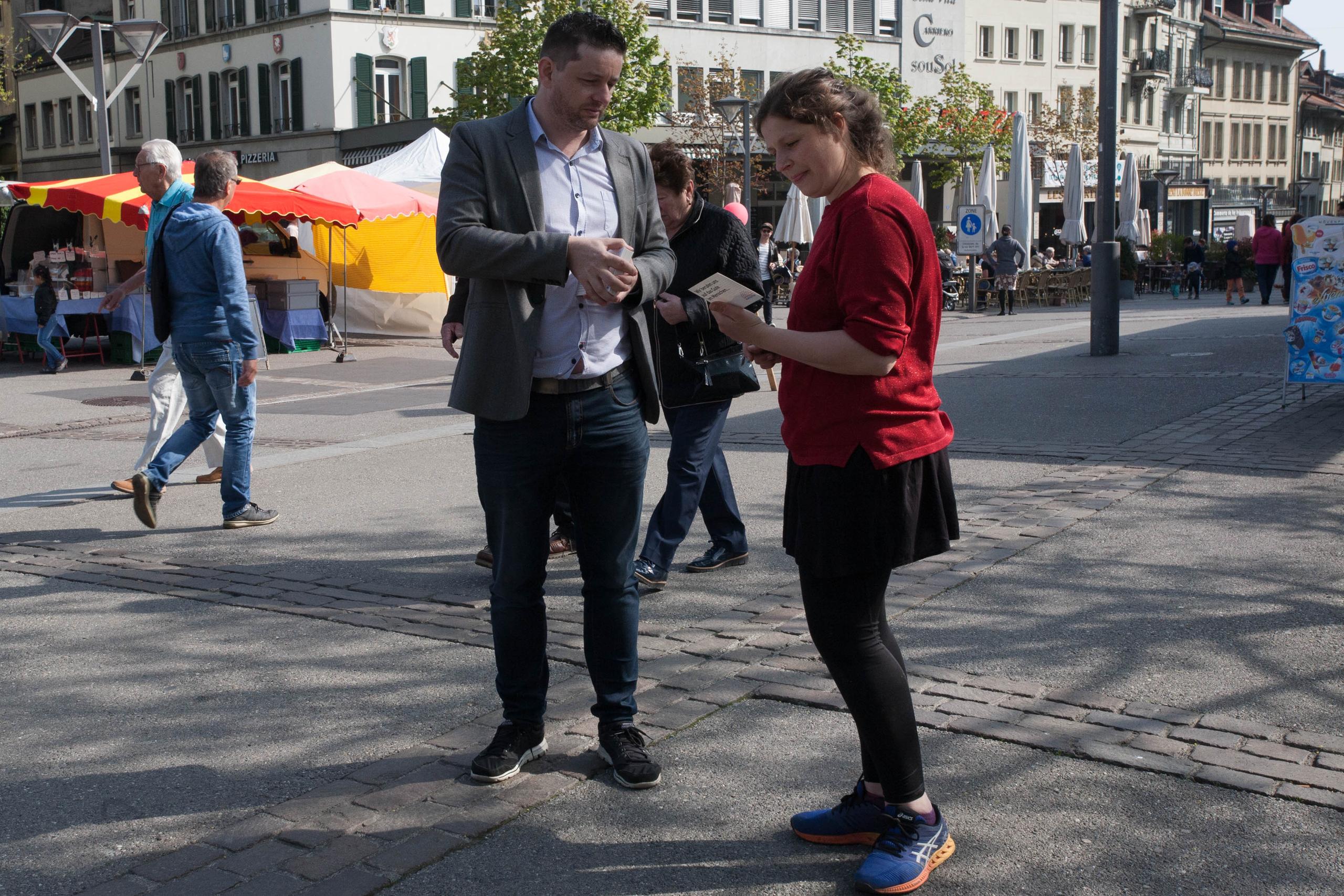What if the House of Representatives were chosen at random?

An outlandish idea? Food for thought, according to most people stopped in a street in Fribourg by two representatives from Generation Nomination (GeNomi), a movement which is preparing to launch a people’s initiative to replace election of members to the House of Representatives with a draw.
“A part-time job for CHF120,000 ($119,400) a year – sound tempting?” asks one of the questions emblazoned on the various leaflets which GeNomiExternal link coordinator Charly Pache and activist Nicolas Locatelli are handing out to passers-by in front of Place Python on the city’s main shopping street.
This article forms part of the #DearDemocracy platform on direct democracy run by swissinfo.ch.
The leaflets introduce the serious issue of the proposed initiative, entitled “In favour of a representative House of Representatives”, in a fairly light-hearted way. Each one deals with an aspect of the proposal which GeNomi wants to put to a public vote.
In the case above, the part-time job for CHF120,000 refers to the average time worked and salary earned (including expenses claimed back) by members of the House of RepresentativesExternal link. According to the draft initiative, the conditions would remain the same but instead of being elected, members would be selected by lot for a four-year term.
Equal opportunities and true representativeness
The weekly market is in full flow in the square and the street is bustling. The two activists are looking to engage in a debate and immediately begin detailing the benefits of the initiative, outlining the reasons and aims behind it with passion and conviction. They explain that as they see it, the current House of Representatives does not represent the Swiss people or fulfil democracy’s objective of equality.

“The average profile of a parliamentarian is a male in his fifties with a university education and an army background. This rules out large swathes of the population or leaves them significantly underrepresented. This is the case for women and young people, for example,” Pache tells two women in their twenties.
The initiative
The draft public initiative “In favour of a representative House of Representatives” calls for members of the House of Representatives to be nominated at random for a four-year term of office.
They would be drawn by lot from a pool of everyone entered on the electoral register in the respective districts or cantons. The 200 seats would still be divided among the cantons in proportion to the population as before.
In order to avoid a total lack of experience, the 200 mandates would not be renewed at the same time every four years but in groups of 50 every year instead.
Each person drawn would have the right to reject their mandate, but those who choose to accept it would commit to a year’s training, for which they would be paid according to the same terms as for parliamentary work. The benefits would remain the same as those in force under the electoral system.
Federal parliament would still consist of two chambers: the members of the Senate would continue to be elected.
He continues, arguing that drawing by lot would put everyone on an equal footing, giving them equal opportunities to become members one day. This would mean various groups, and thus the issues and interests of society as a whole, were more equally represented. Rather than owing their seats to a party or interest group, members would be free to decide for themselves and seek solutions for the common good so as not to favour private interests or those of certain groups.
“What do you think? Have you heard of this idea before? Do you think it’s ludicrous or would you consider signing up?” he asks the two women afterwards.
“I don’t know what to say?” replies one, looking stunned. “We’re not really interested in politics,” her friend adds. They walk away rather perplexed.
A man in his seventies listens in to Locatelli’s arguments for a while, refuses to take a leaflet and then walks up to swissinfo.ch, saying: “Yet another ridiculous initiative. What on earth is wrong with them?” He walks away mumbling. He is the only one to disagree so strongly.
There were some other doubtful and sceptical responses but the vast majority of people responded with curiosity and interest. Most people stopped, asked questions and discussed the idea with the two campaigners.
A desire to act or to reflect
“I can’t see how this system of yours would improve things, since it requires the people drawn by lot to be trained [see box]. To be honest, I don’t think it would change anything if we ended up with people who don’t understand the issues and are therefore swayed by economic forces,” says one man, launching into a rant against the Swiss parliament that is “in the hands of the lobbyists and big corporations” in a system “of plastic democrats where, in reality, only those with money get elected”.
He walks off, grinning. He returns a few minutes later to ask if he can leave his address. Others also express a wish to take part in the information campaign.
“Could you give me some more leaflets? I know a few people that might be interested and I want to let them know about the project,” explains one girl. “I think I’d sign up in principle, but I want to find out more first and read the information in more detail. I’ll take a look at your website,” she adds.
One man says he has already heard of the idea but hasn’t made up his mind about it yet. He bombards Locatelli with questions. He listens carefully, challenges a few of the arguments and at one point reveals he is a former member of parliament for the city of Fribourg. When he says goodbye, the ex-parliamentarian says: “It’s an interesting thought. I’ll have to think about it.”
Doubting expertise
“I agree in principle: members [of the House of Representatives] currently have too many strategic interests and this is a problem. However, I believe they would need to be highly intelligent and skilled in making decisions on complex issues. Not everyone can do that,” one young man objects.
Pache responds by citing experiments that have been successfully completed using this system. After all, Swiss direct democracy means people are already accustomed to having to make decisions on complex issues. If people are discerning as voters, why would they not be the same in parliament? Especially because members selected at random would receive a year of training and would consult experts of various persuasions before making any decisions.
One young woman offers similar criticism, judging the idea to be “very interesting but a bit too utopian”. In her opinion, the year of training provided for in the draft initiative is not enough.
“Even if they don’t represent my party or my opinions, I think elected members of parliament still have the skills it takes,” she asserts. “Are you sure?” After thinking about it for a moment, the woman laughs: “Well, perhaps that’s just my utopia.”
It was the first time that GeNomi campaigners had tested the waters with members of the public on the street, in other words the people they will have to convince to help them collect 100,000 signatures in 18 months when they launch their initiative.
Charly Pache and Nicolas Locatelli are really pleased with the feedback, but they are also aware that successfully putting to public vote one of the most contentious public initiatives in the history of Swiss direct democracy without the support of any party or large organisation will be an extremely difficult task. This is precisely why they are spending 2017 raising awareness.
Do you think it would really be more democratic to draw members of the House or Representatives by lot rather than electing them? Let us know!
(Translated from Italian)

In compliance with the JTI standards
More: SWI swissinfo.ch certified by the Journalism Trust Initiative













You can find an overview of ongoing debates with our journalists here . Please join us!
If you want to start a conversation about a topic raised in this article or want to report factual errors, email us at english@swissinfo.ch.